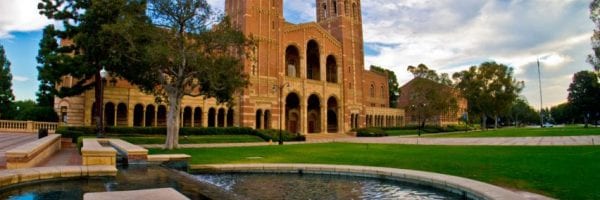Top Southwest Real Estate MBA Programs

A career in real estate is not a common choice for MBA graduates. In fact, a relatively small number of MBA students pursue careers in real estate, but that makes choosing the right business school all the more critical.
Real estate is a highly specialized field, so it’s essential that MBA students have access to the appropriate certifications, majors, centers, professors, and courses. If you’re interested in a career selling, buying, managing, developing, or speculating in real estate, you need to head to a premier MBA program that will help guide you and make the connections required to fuel your success.
The 5 Best Part-Time California MBA Programs

Despite the various challenges of doing business in California, the Golden State remains a powerful driver of business and tech innovation in the U.S. The state even outpaces Great Britain’s GDP in 2018, making it the world’s fifth-largest economy.
For business leaders looking to advance their careers in California without interrupting their current gig, a part-time MBA might be the optimal choice. Let’s take a look at the five best part-time California MBA programs.
5 Best Part-Time California MBA Programs

The UC Berkeley Haas School of Business Evening and Weekend MBA program was named best in the nation by U.S. New & World Report in 2019. This part-time MBA degree is typically completed in two-and-a-half-to-three years, affording students easy access to the Bay Area’s plethora of internship and employment opportunities. The experiential learning focus of the program ensures students have ample opportunities to take on hands-on projects as part of their studies. Tuition for part-time in-state students is $3,363 per credit and $3,363 per credit for out-of-state students.

The UCLA Anderson School of Management’s Fully Employed MBA Program (FEMBA) has been touted as “#1 in SoCal” for over 20 years by U.S. News & World Report. Anderson FEMBA students have three choices when it comes to the scheduling of their part-time MBA: Classes all-day on Saturdays, Tuesday, and Thursday evening classes, or the hybrid schedule, which combines online study with one weekend visit to campus each month. Participants can expect to spend two-and-a-half-to-three years to complete the FEMBA (with both accelerated and extended study options also available). FEMBA has a distinctly international focus, with a diverse student body, access to international study opportunities, and a required international project. Tuition is $42,420 per year.

The USC Marshall School of Business part-time MBA is ranks among the top 15 in the nation, according to U.S. News. The degree is designed specifically for early-career professionals and managers looking for a flexible schedule. The curriculum is divided into core business courses, all taken in the first year, then over 100 electives from which to choose. First-year MBAs can opt for one of two campuses in Los Angeles proper and just outside the city limits. The program duration is three years, and both accelerated and extended are available. With “deep roots” in Southern California and a global alumni network, part-time tuition is $1,912 per credit.

Santa Clara Leavey’s School of Business Evening MBA ranks in the top five part-time programs both among California state schools and national Jesuit schools. With evening classes twice per week, participants can expect to take two years to earn their MBA and must have at least three years of related work experience to begin the program. Located in Silicon Valley, Leavey offers students prime geographic access to tech companies for networking and employment opportunities. Part-time tuition is easily among the most affordable of the high-ranking CA schools, at $1,108 per credit.

The part-time MBA at UC Davis’s Graduate School of Management ranks in the top 9 percent nationally (28th overall). Students take Friday and Saturday classes at campuses in either Sacramento or the Bay Area and can choose between a two-year and four-year pace for their degree. The flexibility in location allows students the option of access to professional benefits of Bay Area or Sacramento. UC Davis also boasts an 83 percent first-year ROI following graduation. Tuition for part-time students is $1,520 per credit for in-state and out-of-state applicants.
The College Admissions Scandal—Could it Happen with MBA Programs?

Earlier this month, dozens of people—including celebrities Lori Laughlin, William H. Macy, Felicity Huffman, and Mossimo Giannulli—were caught greasing the wheels in a major college admissions scandal. Parents funneled a combined total of $25 million through a college admissions consultant, William “Rick” Singer, to athletic coaches and test proctors, all with the aim of gaining admission for their children to an elite undergrad program. Undergraduate programs entangled in the scandal included Stanford University, the University of Southern California, Wake Forest University, Georgetown University, Yale University and others.
Singer organized the bribery through his admissions consulting operation and a phony non-profit called Key Worldwide Foundation. In exchange for payment, the exam proctors would give students more time for the SATs and ACTs, provide answers and even allow substitute test takers. Meanwhile, athletic coaches would push candidates as recruits at their institution, whether or not they even had athletic experience.

Full House actress Lori Laughlin (left) was one of the major names caught in “Operation Varsity Blues,” paying an alleged $500,000 bribery to get her daughters Olivia Jade (center) and Isabella Rose (right) gain admission to USC / Photo via Gabriel Olsen/Getty Images
“Operation Varsity Blues,” as the FBI has nicknamed the investigation, exposed weaknesses in the college admissions process and demonstrated the shocking lengths that some parents will go to in securing a brand name education for their children.
We’ve seen the pressure and the hope of gaining admission to a top business school—so what’s to prevent fellow MBA applicants from gaming the system? Clear Admit believes there are several key differences in the MBA application space that make the “Operation Varsity Blues” type of scandal less likely.
- GMAC Runs a Tight Ship
The Graduate Management Admissions Council (GMAC) owns the GMAT exam, a test required by a majority of leading business schools for admission. The test is only offered via computer, making it harder to bribe a proctor for extra exam time. It also features strict identity security—including palm scanning—that thwarts any attempt of substitution of the test taker. Fraudulent attempts to increase GMAT scores have happened in the past, but GMAC has been swift in taking appropriate measures to avoid future threats to the integrity of the test. For instance, GMAC explicitly chose Pearson as the designated administer of the exam in 2006 due to the firm’s track record in testing security and anti-fraud measures. - Without Sports, There are No Coaches to Bribe
There are no formal athletic programs in graduate business programs. Unlike for the undergraduate scandal, the space for which one would pay simply does not exist. - Integrity Matters, and AIGAC Helps
The Association of International Graduate Admissions Consultants (AIGAC) released a statement upon news of the undergraduate admissions scandal: “AIGAC was established with the express purpose of setting high ethical standards in the graduate admissions consulting industry…AIGAC exists to provide support and professional development for those helping young people self-reflect through the admissions process and attain the right education in the right way.” Scott Shrum, former President and COO of Veritas Prep and current Secretary of AIGAC, added, “One of the most important things AIGAC does is keep the lines of communication open between the admissions consulting industry and administrators at schools. The more the admissions process seems murky to applicants, the more room that shady operators have to operate in the twilight and promise things that they really shouldn’t be promising. The more transparent the process is, the less room there is for that sort of behavior, and AIGAC has helped schools find allies in the industry who also want more transparency. A good admissions coach helps an applicant see the process more clearly and approach it with more confidence, and I credit AIGAC and the schools for helping to make that situation better over the past decade.” - Admissions Consultants Offer Advice On How to Put Your Best Foot Forward, Not Tips to Cheat the System
Shrum also notes, “The journalists who conflate legitimate coaching with this scandal are either deliberately doing it or are missing the point. That’s like saying that hiring a tennis coach and giving your kid steroids are both ways to help your child do better in a tournament, so they must not be very different. While this scandal has rightly shed more light on the college admissions game, Rick Singer and his cronies weren’t admissions counselors. They were crooks.” - Applicants are in the Driver’s Seat
Clear Admit co-founder, Graham Richmond, shared the following observation, “Helicopter parents are much more likely to be present in undergraduate admissions. By the time young people turn their attention to the MBA, they are usually the ones driving the process (and NOT their parents) and therefore, there is far less likelihood of fraud.” - Sooner or Later, the Truth Will Come Out
Shrum also offered this perspective, “I think it would be naive to think [such a scandal] can’t happen in MBA admissions. In the test prep space, the Scoretop scandal from 2008 showed the lengths that people will go to in an effort to boost their GMAT scores. On the admissions side, it’s inevitable that an applicant from a well-connected family, or whose boss is a huge donor to a school, has a leg up in the process. As long as universities value fundraising, I think this will always be the case. With all that said, however, it’s important to keep in mind that business school classes tend to be much smaller than undergraduate colleges, so it’s much tougher to ‘hide’ a mediocre applicant in a class. But it surely happens.”
While the system itself clearly has several safeguards against fraud, Shrum left us with a dose of reality:
“Unethical clients and unscrupulous admissions consultants find each other. It’s rare that an innocent family gets steered into bribery by an unethical consultant, or vice versa. They know what they’re up to, and what/whom to look for. I can’t count the number of times an applicant or parent has asked me, ‘So you’ll write the essays for us, right?’ and when I explain that’s not how it works, they move on. In some cases, I’m sure they find an admissions consultant who will do just that for them. Both parties know that what they’re doing is wrong, but they seem to have no problem doing it.”
The view at Clear Admit is that what happened in the “Operation Varsity Blues” case is clearly repugnant and unethical. It is also sad and a little puzzling.
Richmond offered the following thoughts: “On some level, this shouldn’t be shocking; it’s certainly not the first time we’ve seen people have ethical lapses when they can line their own pockets with money. But what sticks with me is the role that the parents played. These parents—who are presumably well educated and could have theoretically provided a great environment for their children to become smart young people and get into great schools on their own merit—felt the need to cheat. I wonder if they were perhaps too busy with their careers and not bothering to parent (resulting in kids who weren’t motivated enough) … or if they were somehow led to believe that this is how the college admissions game is played. Or perhaps it was just a case of them desperately wanting to be able to brag about the success of their children at cocktail parties? In all cases, it’s just profoundly sad.”
This article on the recent college admissions scandal has been edited and republished with permissions from its original source, Clear Admit.
The Top Healthcare MBA Programs in California
The California healthcare industry is booming. The industry employs more than 1.4 million people across ambulatory settings, hospitals, and residential care facilities. And as the population continues to age, there’s no doubt that the healthcare industry will continue to expand.
So, it should come as no surprise that an MBA in healthcare is becoming a more popular track for future business leaders. With the industry estimated to be worth $2.26 trillion, there are many opportunities across the board. The key is to choose the right healthcare MBA.
Here are our top six California Healthcare MBA programs:
Work Friends May Not Get Better Benefits, According to UCLA – LA News

As we fully unroll into the new year, we take a look at some of the biggest recent news coming out of Los Angeles.
UCLA Anderson Professor on Work Friendships’ Effects – UCLA Anderson News
Research by Eugene Caruso, Associate Professor of Management and Organizations at UCLA Anderson School of Management, recently received note in the online forum Quartz at Work.
Caruso, along with colleagues from the University of Chicago and Hebrew University, studied the consequences of friendships between managers and employees. Through a series of experiments, the team discovered that when a boss makes a decision, such as who gets a bonus, they are actually less likely to give it to a friend in order to appear impartial. This tendency remained much of the time even when the friend was the more highly deserving candidate for the bonus.
Notably, when managers had to make a decision on a bonus that would remain private, they were more likely to choose the deserving friend. Participants in the research were told that the friend had performed only slightly better than the other bonus candidate, and that the choices were to give the friend the merit-based bonus or to flip a coin to decide between the two. In the public decision scenario, the deserving friend received the bonus 27 percent of the time. When the deserving worker was the non-friend, participants granted the bonus over 60 percent of the time.
The research overall revealed that participants were more likely to approve of the merit-based bonuses. The study can serve as an important model for HR managers on the unintended outcomes of workplace relationships.
Read more about the team’s research here.
Mihaylo Professors on China Trade War and the SoCal Economy – Mihaylo News
Associate Professor of Economics Pedro Amaral and Lecturer Aaron Popp of Cal State Fullerton’s Mihaylo College of Business have examined the impact of the U.S. and China Trade War upon one of the most influential economies, that of Southern California. The region serves as a hub of trade with East Asia.

Cal State Fullerton professor Pedro Amaral
In the panel discussion last month sponsored by the CSUF Economic Association, Amaral and Popp presented their research.
“About 46 percent of total Chinese imports are being tariffed, but L.A. is serving a smaller percentage of those products [that are being tariffed]–41 percent. But any later round of tariffs will have a harder impact on the local economy,” Popp notes.
Reflecting upon the long history of the tension between the two world powers and the nature of China’s transition, Amaral says, “China has had an incomplete transition into capitalism, which the West still ponders about China …We used to think that once they got into free trade, they would become a freer society upon the embrace of the market economy. But they haven’t, which is something my liberal mind struggles with.”
You can read more on Popp and Amaral’s discussion here.
Graziadio Strategy Professor on Corporate Boards and Entrepreneurship – Graziadio News
Dr. Mark Tribbit, Pepperdine Graziadio Assistant Professor of Strategy, was honored recently for his scholarly research with the 2018 Emerald Literati Award. For the past 25 years, the award has acknowledged valuable contributions to scholarly research.
Tribbit’s research, “An Agency Perspective on the Board of Directors and Corporate Entrepreneurship,” examined the effect of takeovers upon internal entrepreneurship. The outcome of the research will help corporate boards to foster entrepreneurial efforts by staff.

Dr. Mark Tribbit, Pepperdine Graziadio Assistant Professor of Strategy / Photo via newsroom.pepperdine.edu
In addition to his professorship, Tribbit serves as the Academic Director of Graziadio’s full-time MBA program. Experienced in management for corporate, retail banking, and wholesale, Dr. Tribbit received his MBA from Villanova University, and his Ph.D. in strategic management from Drexel University.
You can read more about Dr. Tribbit’s award and his full article here.
The Big Picture: The 5 Most Important MBA Numbers of 2018

Each year there’s a ton of new information that comes out about MBA programs. From new rankings to the latest GMAC news, there are a thousand little tidbits that can overwhelm applicants, students, and alumni. We’ve collected the most important MBA numbers of 2018.
To pare down the news into the information you need to know, we’ve taken a look at the big picture of the MBA for 2018 and outlined the five most important pieces of data you need to know. We’re talking about everything from the decline and U.S. MBA applications to the increase in female enrollment, the higher salaries and GMAT scores, as well as the increase in interest in technology. Continue reading…
